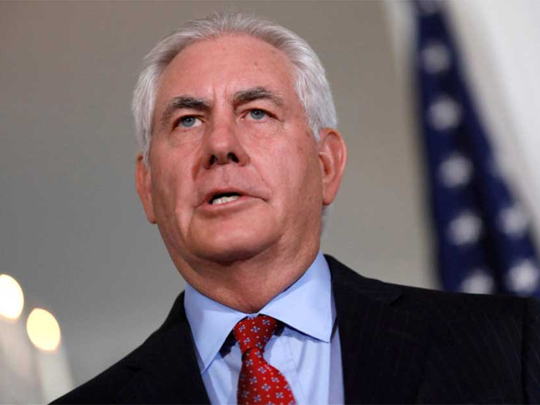
United States President Donald Trump’s top lieutenants are going rogue again.
Week before last, his secretary of State, Rex Tillerson, refused to say whether Trump’s statements about violence in Charlottesville, Virginia, reflected American values. Trump’s chief economic aide, Gary Cohn, suggested that the president was wrong to equate white supremacists with “citizens standing up for equality”, and said the administration “must do better”. Trump’s Secretary of Defence, James Mattis, told troops that because of internal strife, the US has lost its global “power of inspiration”. He didn’t mention the president, but he didn’t need to.
It’s hard to overstate how unusual this is. In most administrations, top advisers may complain about the president they serve — but only in private, never in public. In the wake of Charlottesville, some of Trump’s lieutenants felt the need to express their anguish in the open, if only to preserve their self-respect.
Either that, or they’ve learned that the best way to get a message to the Oval Office is to appear on Fox News or give an interview to the Financial Times.
This isn’t a team of rivals; it’s a team of anguished dissidents.
It’s natural to look at this picture and ask, if they’re so unhappy, why don’t any of them resign? But that’s not how Washington works. No Cabinet member has quit over a matter of principle since Cyrus Vance, former US president Jimmy Carter’s secretary of State, almost 40 years ago. Most important, all those Cabinet members have accepted the traditional Washington argument about serving a president you disagree with: As long as you think you can do some good, you owe it to the country to keep your job.
That logic still works for Mattis, who appears to have Trump’s confidence, especially on questions of war and peace. It even works for Cohn, who is one of the architects of Trump’s most important economic initiative — the tax cuts he’s hoping to enact this fall. But it no longer works for Tillerson, an honourable man whose tenure at the US State Department isn’t turning out well. He should seriously consider resigning, unless he prefers to wait until he’s fired. The former ExxonMobil CEO was never fully in sync with Trump on basic principles of foreign policy. Trump’s version of “America First” considers every treaty an encumbrance; Tillerson wants to preserve traditional alliances. Trump withdrew the US from the Paris agreement on climate change; Tillerson thought it would have been better to stay in. Trump wants to blow up the international agreement limiting Iran’s nuclear programme; Tillerson disagrees.
What more, Tillerson seems to have been marginalised. He’s been left out of meetings with visiting foreign leaders. He’s seen important diplomatic issues — Israeli-Palestinian peace talks, China, Mexico — put in the purview of the president’s son-in-law, Jared Kushner.
Tillerson hasn’t even been allowed a free hand to run the US State Department, even though he’s the former CEO of a multinational company. White House aides blocked a series of key appointments he wanted to make — and then blamed him, anonymously, for the slow pace of nominations. As a result, the State Department is operating below normal strength, without full-fledged assistant secretaries in charge of policy towards North Korea, the Middle East or Afghanistan.
In practice, his most important job has been to serve as a diplomatic clean-up crew — to reassure allies in Asia that the president didn’t really intend to start a war with North Korea, and allies in Europe that he wasn’t going to abandon the US commitment to defend Nato countries from Russia.
And that’s why Tillerson’s most recent dissent made his position worse. When Fox News host Chris Wallace asked him if other countries could rely on the US defending its traditional values, Tillerson said: “We express America’s values from the State Department.”
“And the president’s values?” Wallace asked.
“The president speaks for himself,” Tillerson said.
“Are you separating yourself from that?” Wallace asked, giving him a chance to clarify.
“I’ve made my own comments as to our values,” Tillerson said.
The message to the foreign governments Tillerson deals with is that he and the president aren’t on the same wavelength; if anything, they’re drifting apart. By speaking his conscience, he has made himself even less effective than he was before. It’s unfair, but it’s true.
Richard N. Haass, the president of the Council on Foreign Relations and a former aide to former secretary of state Colin L. Powell, recently suggested two questions that Cabinet members should ask when they find themselves at odds with the president. First, are they making “a meaningful difference” by staying? Second, are they “having to defend policies they disagree with”?
For Tillerson, the moment to confront those questions has arrived. If Trump wants him to stay, the president had better say so, loud and clear. If he doesn’t, Tillerson needs to go — not for his own peace of mind, but for the sake of American foreign policy.
— Los Angeles Times
Doyle McManus is a senior columnist for the Los Angeles Times.









